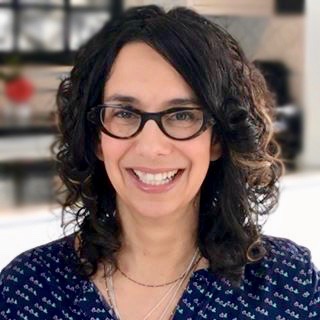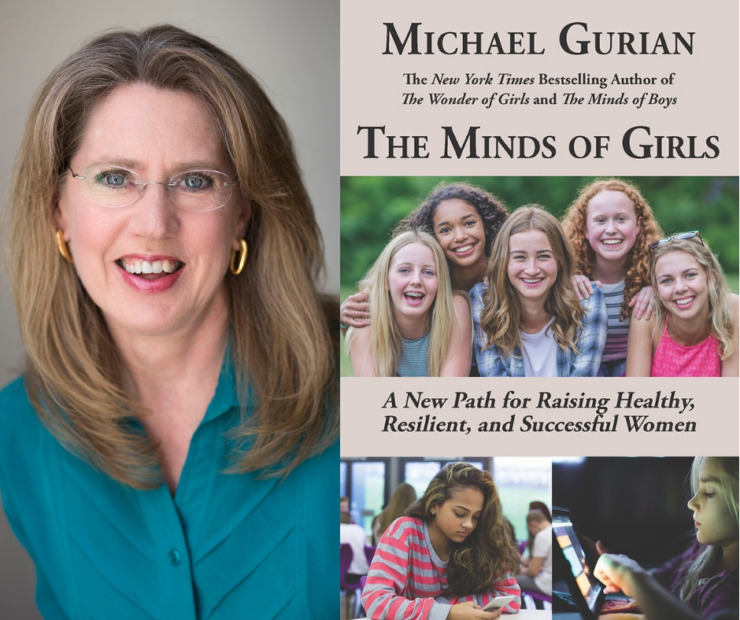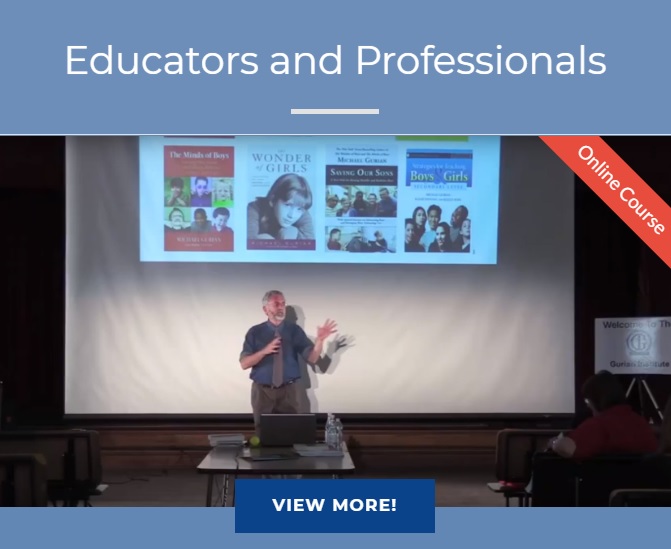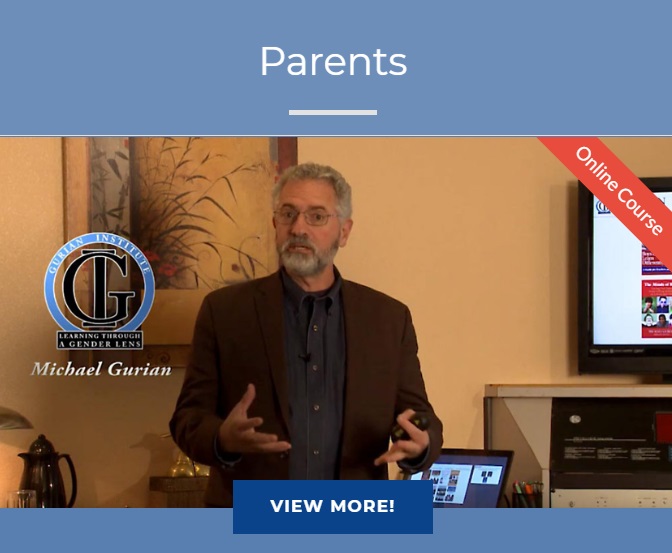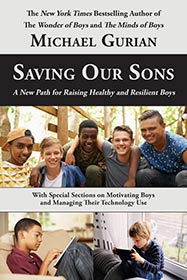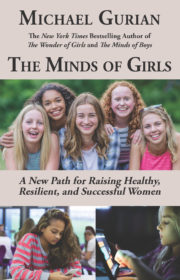
This week we are proud to feature a blog post by Susan Jentzsch, the Director of our Summer Institute and author of the Teen Leadership Forum. After spending 20 years at Qualcomm, Susan branched into teen support, with a special interest in gender intelligence and the gender lens. She is a true innovator in more than one field and she will be presenting three workshops at this year’s Training Institute in June. Welcome aboard, Susan! –Michael Gurian
30 Years In the Making
I spent much of my young adult life working for a multibillion dollar, high tech company. My job was to design and build office and lab space for engineers to create new product lines and continue to improve upon the old ones. In a sense, I helped create the authentic space in which these other people could do their magic.
As this company grew up, I did, too. We went from a small start-up company to a worldwide super power of brains and technology. It was fun, fast paced and oh-so-stressful. I loved almost every minute of it. But I paid a price—both as person and as woman. For years, I had to stay on top of an internal conversation of my own unworthiness, of not being good enough. As the years passed, I found myself in an emotional and physical paralysis.
Only later did I realize I was operating in ‘survival’ mode. I was playing the game. I was doing all the things my management team wanted me to do, working very long hours without self-care, and burning my candle at both ends. By now, almost twenty years into my career, I knew I had to do something different or I would self-destruct.
A friend suggested I attend a growth and development weekend. I did, and it altered who I was in this world. I learned that my life experiences must come from my own design. I learned that my thoughts control my experiences; thus, changing my thoughts about an issue could completely alter the way I felt about my life. I also learned, I had a lot to learn!
All of us at the Gurian Institute want the weekend Training Institute in June to be a connecting and internalizing experience for you, too. The workshops I will be doing focus on helping each participant to look carefully at both self-care and how to help students and children understand self-care. Especially in our present era of high stakes testing and constant performance anxiety and stress among our students, these are crucial themes.
The Body and Brain Do Keep Score
For years my body was sending me signals I ignored, signals meant to slow me down enough to listen to my own internal wisdom. Instead of understanding them, I plowed through because I had a lot to do!
But one day, standing in front of the elevator, waiting for the doors to open, I hoisted my way-too-heavy, crimson, leather satchel onto my right shoulder, and instantly I could feel every single vertebra in my spine collapse all the way down. It was excruciatingly painful; it felt like there was nowhere for the last vertebrae to go except deeper into my spinal canal.
The next week, I saw an orthopedic surgeon who said it was within the top 5 worst herniated disks he had ever seen. I had no choice now: I had to stop, I began to listen. Through a period of stillness, I realized my emotional and physical paralysis were intimately tied together. Body, mind, and soul are not three isolated systems. They are three systems intricately woven together that give us our human experience.
In my workshop, I’ll explore with you how to help students (and yourself) to look at the effect of negative feelings inside our bodies. This negativity must be released somehow–if we don’t work through pain and anger, they will fester inside and create dis-ease in our bodies and brains. The dis-ease will increase not only in physical distress but, among our students especially today, in anxiety and depression.
Like many of us, our students are operating from an internal conversation of being less than, not good enough. They try to measure up to an ideal image of what they think they must become to be authentic and successful. If too much of that self-measurement is negative and filled with self-loathing, they just keep spiraling. While they may undoubtedly feel a fire of their youth burning inside them, the fire just makes them more anxious.
The body and brain do keep score and, ultimately, we pay the price in vitality, joy, ease, and for some students today, the performance arms race and other stressors are so debilitating, they are leading to suicide—literally, they are costing lives.
The Heart of the Matter
Author Elvin Semrad writes, “The greatest sources of our suffering are the lies we tell ourselves.” To authentically and fully help our students and children, each of us must first “acknowledge, experience and bare” the reality of life – with all it’s pleasures and heartbreaks. Our teens are trying to do this every day. They are forced—internally via hormones and brain development, and externally via cultural imperatives—to try to know what they know and feel what we feel.
This is the art of Social Emotional Learning, the SEL we are all looking at these days in our training and reading. It is the heart of the matter. SEL and academic achievement combine to make a strong, healthy student. Attachment with teachers and staff, counselors and coaches, parents and mentors—this is crucial. Through our example and our connection with students, the students feel the power of social emotional intelligence building within themselves.
As we look at this theme of the heart in the Summer Institute, we will explore how our own and our students’ experiences of life are created, in some large part, by thoughts about being good enough and not good enough. Our brain is very malleable and with practice, we can certainly create new thought patterns to inspire and ignite creativity.
As I’ll note in my workshop, it was from a place of creativity that I invented myself into a new person, employee, leader, teacher, friend, wife, coach, and parent of a teen. Soon enough, many people in my workplace noticed that things were very different about me. Some people had a hard time articulating what was different. Most often, though, I heard, “You’re way nicer and easier to work with.” UGH – you mean for 10 years, I wasn’t nice?”
I guess I was difficult to work with. I had become demanding and a bit of a bully. I behaved one way with my clients, and a very different way with my support staff – those I really needed to get my job done. And the gender dynamic became a crucial part of this—I came to see that male and female behaviors were an underpinning for both the good and the bad.
She Said, He Said
This understanding led me to discover the work of Michael Gurian. Before long, I saw the piece that was missing from so much of our society’s educational and corporate training: the nature, nurture, and culture conversation in individual women and men. Yes, for years, I had heard about “gender sensitivity” and “gender dynamics,” but now I discovered the science behind all of that. This discovery led me to become a Gurian Certified Trainer.
Soon, I learned strategies connected to male/female brain differences. Our teams explored these and soon the entire team started to function very differently. We no longer argued in meetings as much, pointed fingers to blame others, had side bar conversations that were totally distracting. We learned how to best support each other based on what was needed to feel successful and supported.
We still competed with one another when necessary for motivation, but no longer in unnecessary, power-struggling ways. We started complementing one another because we understood both what made each of us feel connected, and the behaviors that best gave us a sense of belonging in a team.
It has been a pleasure for me to join the Gurian team, first as a Certified Trainer and now as Director of the Summer Institute. I am bringing thirty years of experience in corporate, educational, and coaching work to my breakout sessions. These sessions have, indeed, been thirty years in the making.
In Survival Skills for Girls in STEM: What Women Need Girls to Know, we will:
- Explore the Four Agreements
- Strategize how to work to our own and our students’ strengths
- Gain practical tools for working in synergy rather than dominance
- Learn how to help girls survive and thrive in STEM classes and STEM professions.
In The Body and Brain Do Keep Score, we will
- Learn how to identify key stressors within ourselves and in our students
- Explore strategies for helping our students (and ourselves) de-stress
- Look at how to work with the ‘stories’ of each situation and interaction
- Deploy authentic methods of mindfulness to help students remain calm.
In She Said, He Said. Strategies for Working Together in Female/Male Teams, we will:
- Look at how to create gender-balanced leadership
- Tie differences in female/male brains to every day interactions
- Transform our understanding of leadership styles through a gender lens
- Specifically deploy five new Tools for efficient and gender-intelligent teams.
I hope you will join me, Dr. Gurian, and all our presenters at this Summer Institute. The weekend will be a great learning experience, and we will have some good laughs – I have so many funny stories to share! Join us for this opportunity to continue exploring how we can best support our children and students—and in the process, ourselves.




